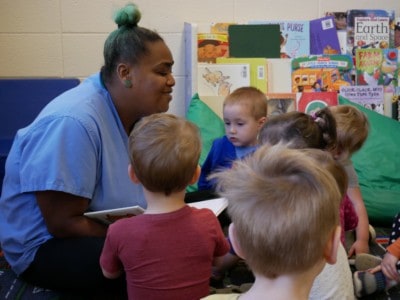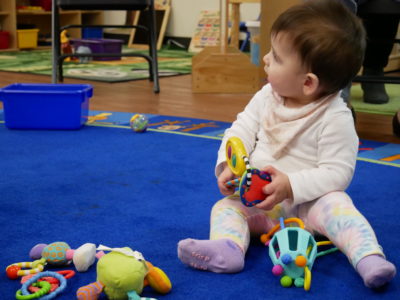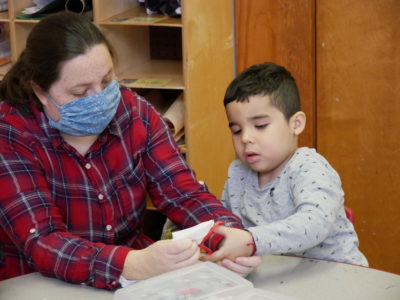
Share this story
- CandL is a multidisciplinary effort to move North Carolina toward a publicly funded system of early education. Here are its first lessons from talking with communities about their needs and dreams.
- We can “put a Band-Aid on the cut, but if we don’t really get some antibacterial stuff in there, it’s gonna get infected,” says Shanda Sumpter, @ncchild’s early childhood education project director, on the need for long-term solutions in early care and education.
The biggest barriers to child care are accessibility and trust, say parents and providers in Mecklenburg, Craven, and Durham counties.
And those barriers, of course, are critical. Lack of accessible, high-quality early care and education keeps some parents from work and some children from nurturing experiences in a period of critical development.
Those parents, caregivers and educators were part of research by CandL, a multidisciplinary coalition aimed at moving North Carolina toward a publicly funded system of early education.
“We want to make sure that all children in North Carolina have access to affordable child care and equitable child care,” said Shanda Sumpter, NC Child’s early childhood education project director and a CandL coordinator.
What’s the issue with how things are?
The state’s licensed early care and education network has space to reach about a quarter of infants and toddlers with working parents. But it serves a smaller share, largely because of staffing and financial challenges, a report from the Child Care Services Association said in May.
Parents need financial and other resources to access the options that do exist, CandL researchers said.
Sign up for Early Bird, our newsletter on all things early childhood.
“Right now we know the bulk of the cost falls on the parents, and we want to shift that,” Sumpter said.
Families also are more likely to access child care that meets their needs if they have traditional working hours, English proficiency, and the time and energy to advocate for their children, CandL researchers say.
24-county tour for solutions
Instead of assuming how parents and early childhood providers would like to see the system change, CandL is asking. The coalition has partnered with community-based organizations in 24 counties that are talking to families and child care providers.
Eventually, that input will lead to policy recommendations. Organizations have held sessions in 13 counties, and the coalition has plans to expand to more, Sumpter said.
The Blue Cross and Blue Shield of North Carolina Foundation and ChildTrust Foundation have funded the work so far.
In the meantime, the state legislature will convene for its long session next year. Many early childhood providers are concerned about how they will keep their doors open after pandemic-related relief funds dry up in the spring. Long-term solutions are needed, Sumpter said.
“We can, you know, put a Band-Aid on the cut, but if we don’t really get some antibacterial stuff in there, it’s gonna get infected, and it’s going to be a bigger mess,” she said. “Which is what I honestly think we’re heading for.”
Related reading



Though these answers probably will evolve as the effort goes on, here’s what they’ve learned so far:
Gaps in accessibility and trust
Parents in the listening sessions said they cannot access child care because they cannot afford it.
The financial help that does exist through the state’s subsidy program requires parents to be working. But parents made clear to CandL that this is a barrier: Finding a job before having child care is challenging, especially when subsidy waitlists mean accessing that care is delayed.
Parents mentioned other access barriers, such as waitlists for programs, location, language differences, and their work schedules.
Some parents also said they don’t trust that providers can meet the social, emotional, and academic needs of their children, and that their own and their children’s cultural identities are not respected or celebrated by programs, CandL researchers said.
Filling those gaps
Participants also were asked about their aspirations for how to improve access to high-quality options.
Help paying for child care is needed. Grants and vouchers without strict stipulations would increase access, the researchers said.
Providers need support to decrease waitlists and provide transportation and flexible hours.
And awareness is also a part of availability, the researchers said. Having someone parents trust to connect them with resources is important.
When it comes to building trust, CandL lifted up these parent desires from the sessions:
- Relationship-building between providers and parents to ensure parents and children are seen and valued.
- Having providers that are from their own communities and speak their languages.
- Training for providers who are well-paid and consistent.
- Family engagement so providers and parents are working toward common goals.
- Consistency in programs remaining open.
What’s next?
Although the CandL effort will stretch into 2024 and beyond, there are shorter-term impacts from the work, said Devonya Govan-Hunt, executive director of the Black Child Development Institute in Charlotte and a CandL coordinator.
“We’ve got organizations that have never asked questions about a cliff and are asking questions now,” Govan-Hunt said. “We’ve got families that are on the ground having these experiences asking very specific questions about trying to understand how this whole system works, how the process works, and who they need to call, what letter they need to write.”
More listening sessions will occur through the fall, and leaders will then align the project’s vision with that input in 2023. A policy team will spend about six months determining what policies exist and are needed. Priorities will be chosen in 2024.
Editor’s note: The Blue Cross and Blue Shield of North Carolina Foundation and ChildTrust Foundation are supporters of EducationNC.
Recommended reading



